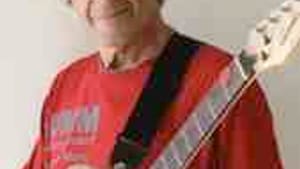Stay in the Loop
BSR publishes on a weekly schedule, with an email newsletter every Wednesday and Thursday morning. There’s no paywall, and subscribing is always free.
Here's the talent. Where's the love?
Guitarist John McLaughlin at the Keswick

"Electric Guitarist" was the title of a 1979 album by John McLaughlin, and those two simple words provide the unifying thread that winds through McLaughlin's career of more than 40 years. Whether he's producing cascading runs of notes played impossibly fast, or thoughtfully plucking out a measured series of poignantly shaped notes, McLaughlin's virtuosity excites the admiration of guitar aficionados.
Admiration, but not love. McLaughlin has never evoked the emotions that signify "guitar god" status. One reason is the nature of virtuosity: Technical perfection can come across as chilly. Even when McLaughlin plays fully from the heart, he mixes genres in ways that sometimes leave his listeners confused or uninvolved.
As a pioneer of the genre known as fusion, McLaughlin was one of the first guitarists to combine the improvisation and harmonic complexity of jazz with the driving rhythm and distortion of rock. He pioneered the exploration of world music, moving from recreating Indian influences in the Mahavishnu Orchestra to actually collaborating with Indian musicians in Shakti. At the same time, McLaughlin has repeatedly returned to his jazz roots over the years.
A crapshoot
This sheer breadth and depth of output, and the number of sonic landscapes he has explored, suggest another reason that McLaughlin inspires admiration but not love. Even his fans— and I count myself among them— won't like everything plays.
So when the opportunity arises to see him live, it can be kind of a crapshoot as to what (and with whom) he'll be playing. Last Friday's show at the Keswick featured McLaughlin's group, the Fourth Dimension: Gary Husband on keyboards and drums; Mark Mondesir on drums; and the Cameroonian bassist Etienne M'Bappé. With them, McLaughlin returned to one of his earliest and most important musical influences, the jazz saxophonist John Coltrane.
The band is tight, and McLaughlin treats them as collaborators rather than backup, allowing equal time for each to solo. When the band clicks— as it did on the song "SeÓ±or," dedicated to McLaughlin's friend and sometime collaborator Carlos Santana— the results are transcendent, with each man's solo building on and responding to the others', and with plenty of McLaughlin's sublime playing.
Approving nods, but…
Unfortunately, however, not all of the results were that satisfying. Though bassist M'Bappé was excellent, Husband and Mondesir just weren't up to his level.
The last song of the main set, for instance, featured a long passage with Husband and Mondesir playing dueling drum solos. Although McLaughlin nodded along approvingly, I was unable to discern anything of interest, rhythmically or otherwise, in what they were doing.
It's always worth seeing McLaughlin live, because he's a truly great guitarist, even on an off-night— and who knows, it might be one of the evenings when it all catches fire. Friday night, alas, was not such a night.
Admiration, but not love. McLaughlin has never evoked the emotions that signify "guitar god" status. One reason is the nature of virtuosity: Technical perfection can come across as chilly. Even when McLaughlin plays fully from the heart, he mixes genres in ways that sometimes leave his listeners confused or uninvolved.
As a pioneer of the genre known as fusion, McLaughlin was one of the first guitarists to combine the improvisation and harmonic complexity of jazz with the driving rhythm and distortion of rock. He pioneered the exploration of world music, moving from recreating Indian influences in the Mahavishnu Orchestra to actually collaborating with Indian musicians in Shakti. At the same time, McLaughlin has repeatedly returned to his jazz roots over the years.
A crapshoot
This sheer breadth and depth of output, and the number of sonic landscapes he has explored, suggest another reason that McLaughlin inspires admiration but not love. Even his fans— and I count myself among them— won't like everything plays.
So when the opportunity arises to see him live, it can be kind of a crapshoot as to what (and with whom) he'll be playing. Last Friday's show at the Keswick featured McLaughlin's group, the Fourth Dimension: Gary Husband on keyboards and drums; Mark Mondesir on drums; and the Cameroonian bassist Etienne M'Bappé. With them, McLaughlin returned to one of his earliest and most important musical influences, the jazz saxophonist John Coltrane.
The band is tight, and McLaughlin treats them as collaborators rather than backup, allowing equal time for each to solo. When the band clicks— as it did on the song "SeÓ±or," dedicated to McLaughlin's friend and sometime collaborator Carlos Santana— the results are transcendent, with each man's solo building on and responding to the others', and with plenty of McLaughlin's sublime playing.
Approving nods, but…
Unfortunately, however, not all of the results were that satisfying. Though bassist M'Bappé was excellent, Husband and Mondesir just weren't up to his level.
The last song of the main set, for instance, featured a long passage with Husband and Mondesir playing dueling drum solos. Although McLaughlin nodded along approvingly, I was unable to discern anything of interest, rhythmically or otherwise, in what they were doing.
It's always worth seeing McLaughlin live, because he's a truly great guitarist, even on an off-night— and who knows, it might be one of the evenings when it all catches fire. Friday night, alas, was not such a night.
What, When, Where
John McLaughlin and the Fourth Dimension. November 12, 2010, at the Keswick Theatre, 291 N. Keswick Ave., Glenside, Pa. (215) 572-7650 or www.keswicktheatre.com.
Sign up for our newsletter
All of the week's new articles, all in one place. Sign up for the free weekly BSR newsletters, and don't miss a conversation.

 Judy Weightman
Judy Weightman